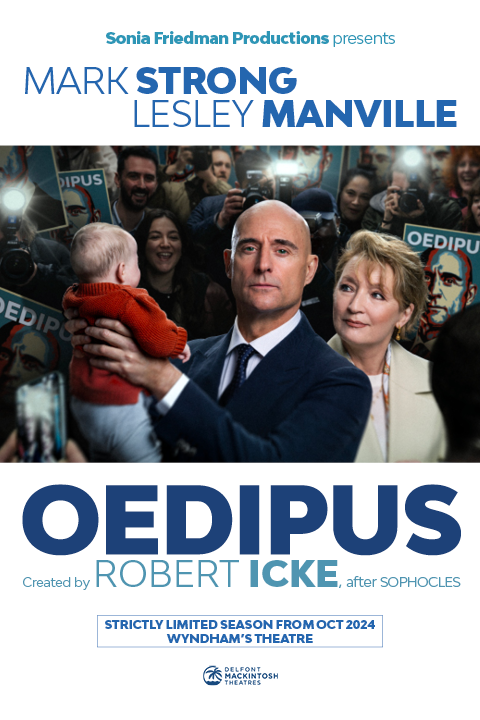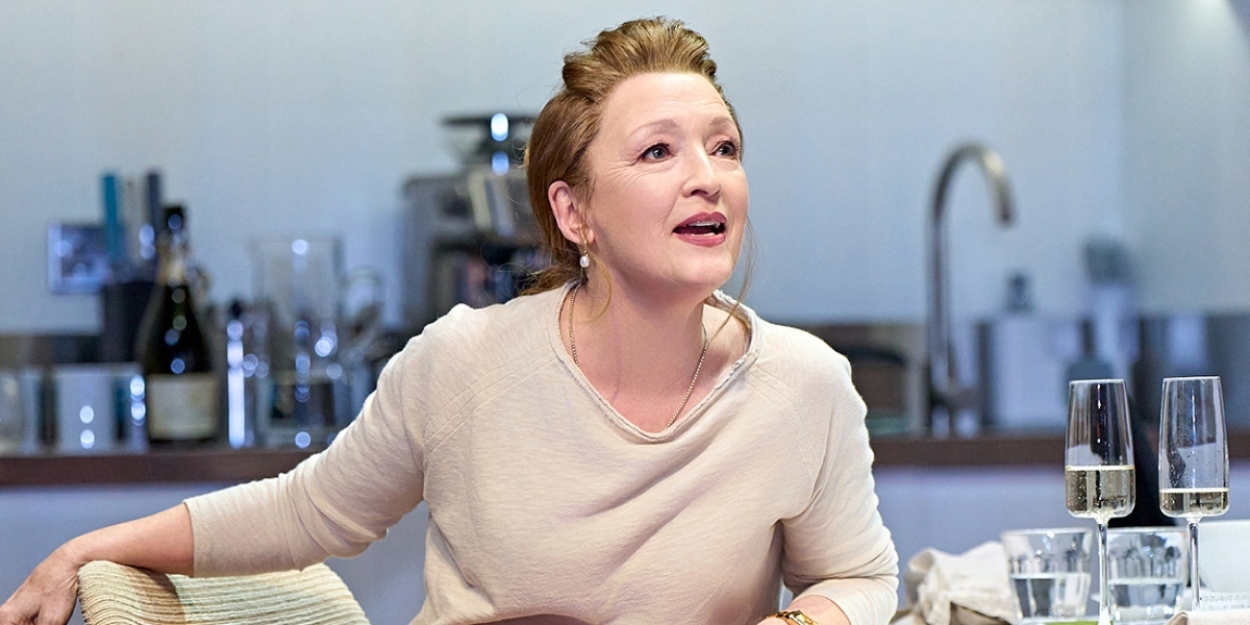Review: OEDIPUS, Wyndham's Theatre
Robert Icke's adaptation of the Sophoclean tragedy is a devastating success.

|
|

![]() Flashback to a dreary Thursday evening in mid-January. Not exactly prime time for prestigious announcements. We were at a show, relaxing on our sofa, or having one last drink before heading home when phones started vibrating left and right. Out of the blue, apparently randomly, two different productions of Sophocles’ most buzzy tragedy were announced.
Flashback to a dreary Thursday evening in mid-January. Not exactly prime time for prestigious announcements. We were at a show, relaxing on our sofa, or having one last drink before heading home when phones started vibrating left and right. Out of the blue, apparently randomly, two different productions of Sophocles’ most buzzy tragedy were announced.
On one side of the ring, Mark Strong and Lesley Manville were joining Robert Icke’s rendition, the one that might have, at some point, been rumoured to be put up in Birmingham or somewhere. At the other corner, Indira Varma and Rami Malek were being programmed for The Old Vic.
An epic battle of Oedipuses appeared on the horizon. While Ella Hickson’s isn’t on until next year, Strong and Manville are finally ready to play dysfunctional together. We weren’t joking when we said the word ‘epic’, Icke decided his take was going to be just over two hours long without a break. Cue all the usual questions: when do we pee? What about interval drinks? It’s a couple hours, people, you’ll survive and live to tell the tale. It’ll be worth it.
%2C%20Mark%20Strong%20(Oedipus)%20%26%20Lesley%20Manville%20(Jocasta)_%20Credit%20-%20Manuel%20Harlan_%20130.jpg)
Oedipus is the mythological king of Thebes who unknowingly fulfils his prophecy, slaying his father and accidentally marrying his mother. Icke opts for an “After Sophocles” reworking, relocating the action to the night before the polls close at a modern-day election. The project is bursting at the seams with prompt ideas: the enfant prodige of British theatre does it again, more or less (more on this later).
This Oedipus lives between the lines of family drama and tragic historical-fiction, an intertemporal adaptation that strongly echoes the discussions that preceded the Obama administration and that keep popping up in right-wing circles. You come out of it positively stunned: the unbroken running time heightens the pacing, turning the piece into a breathless marathon towards an inevitable, gory finale worthy of any noble Greek tragedy.
%2C%20Lesley%20Manville%20(Jocasta)%2C%20Jordan%20Scowen%20(Eteocles)%20%26%20James%20Wilbraham%20(Polyneices)_%20Credit%20-%20Manuel%20Harlan_%20074.jpg)
While the material hits you like a ton of bricks from every side, titling it Oedipus is a disservice to Jocasta. Manville is sensational as the mother-wife of Strong’s charismatic and unabashedly genuine politician. It’s her show as much as it’s his. She becomes the centrepiece, arresting with her harrowing retelling. Headstrong yet vulnerable, she takes the Wyndham’s by storm.
The trio of female performances - Manville, June Watson as Merope, and Phia Saban as Antigone - establishes a dynamic that’s as engrossing as the central plot. Quick remarks push the creaky relationship between Jocasta and Antigone to the surface, revealing a fine rivalry between a jealous parent and an unforgiving daughter who toys with feminist nihilism. Watson is equally compelling, stopping the scene altogether with her big reveal after being gently and apologetically ignored by her son over the evening of celebration. This solid and authentic network of connections between each minor character points firmly at the main role, sealing the original lore.
%2C%20Mark%20Strong%20(Oedipus)%2C%20Lesley%20Manville%20(Jocasta)%2C%20James%20Wilbraham%20(Polyneices)%20%26%20Jordan%20Scowen%20(Eteocles)_%20Credit%20-%20Manuel%20Harlan_%20097.jpg)
in Oedipus
Strong is statuesque, towering over the rest of the cast with a mighty dignity that occasionally tilts into brief fits of rage. He introduces an emotionally intelligent man; devoted to his wife and unafraid to show his feelings. The politics of his Oedipus are soundly rooted in honesty. He’s almost obsessed with the concept of truth. The sweet guy who was ready to celebrate a landslide win sits childlike on the floor, listening to his mother’s story.
As the countdown ticks towards zero, his life implodes swiftly. It’s a night of revelation for both characters and spectators. These invigorating portrayals are orchestrated by Icke with an astonishing rhythm. The director, however, leans into the obvious multiple times throughout - from Freudian slips to relentless foreshadowing, even Chekhov’s beloved gun makes an appearance. Regardless, his script is direct and nuanced, layered and linguistically interesting. It can also be accidentally funny.
%2C%20Mark%20Strong%20(Oedipus)%2C%20Lesley%20Manville%20(Jocasta)%20%26%20Michael%20Gould%20(Creon)_%20Credit%20-%20Manuel%20Harlan_%20187.jpg)
He plays with intensity, weaving a steady flow of tension and relief through a meticulously calibrated visual direction and snakily manipulating soundscape by Tom Gibbons. Icke’s brand of glacial naturalism translates into a corporate set design by Hildegard Bechtler. Everything unfolds as the team behind Oedipus’ political campaign clears out their headquarters. As they wait for the polls to close, the space is gradually stripped of its furniture until the couple are the only figures left. Icke’s production reaches its full potential with this final stretch of the play, crafting an intellectually disturbing resolution intended to shake the audience up.
The two hours fly by. After years of absence, it’s a glorious return to the stage for Strong and Manville (curiously, they both last trod the boards at the National, the former in 2017 and the latter in 2020). It’s a delectably tragic and exquisitely horrifying piece of theatre. Not exactly an easy watch, but one bound to instigate an intriguing conversation. It's a devastating success.
Oedipus is running at the Wyndham's Theatre until 4 January.
Photo credit: Manuel Harlan
Comments
Videos
